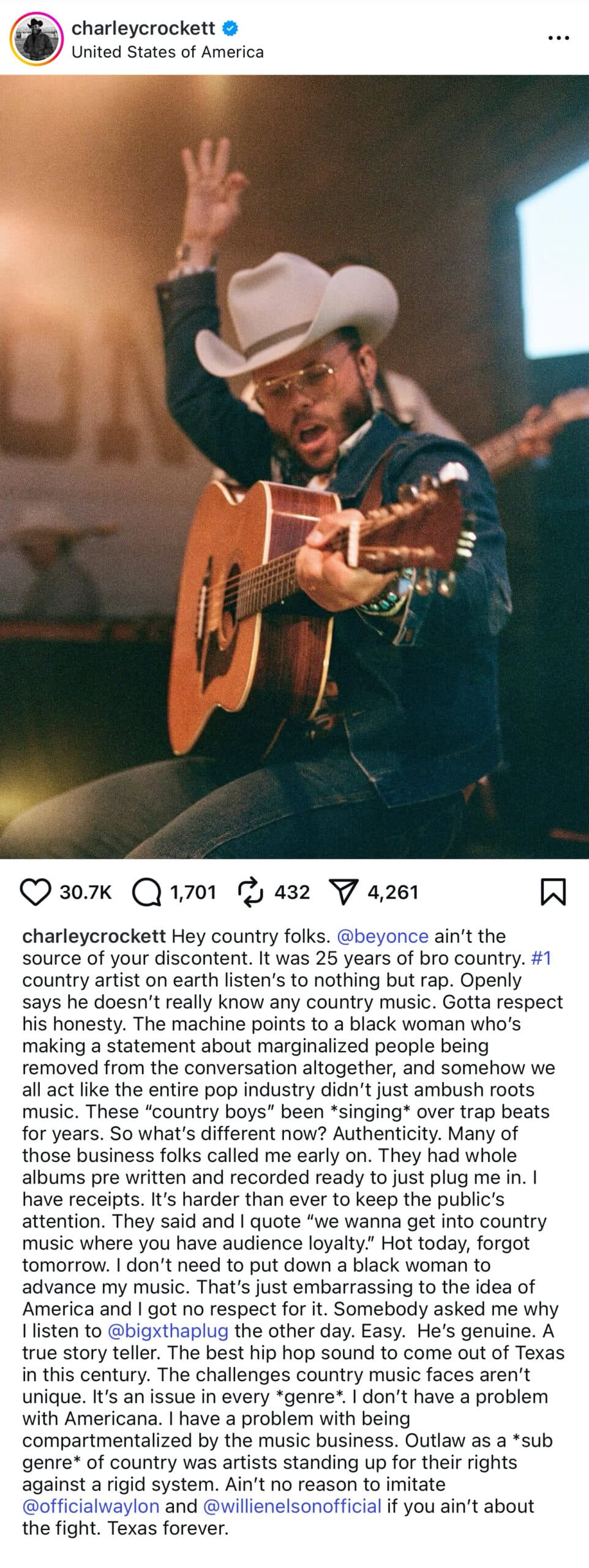
Texas Honky-Tonker Charley Crockett Takes Aim at Nashville’s System While Ripping Bro Country and Industry Hypocrisy
Charley Crockett has never been one to bite his tongue, and now he’s firing straight at the machine that’s been watering down country music for decades.
The San Benito, Texas native lit up social media with a post that called out bro-country and the Nashville system for gutting authenticity out of the genre. While some artists have been blaming Beyoncé’s Cowboy Carter for threatening country’s identity, Crockett cut through the noise: “Hey country folks. Beyoncé ain’t the source of your discontent. It was 25 years of bro country. These ‘country boys’ been singing over trap beats for years.”
That one line set the internet ablaze, and it wasn’t hard to tell who he was talking about. Morgan Wallen, the biggest star in mainstream country right now, openly admitted this year that he doesn’t even listen to much country music. Crockett didn’t name names, but the shot landed. “The #1 country artist on earth listens to nothing but rap,” he said. “Gotta respect his honesty.” The implication was clear: how can Nashville claim to guard the genre’s purity while rewarding artists who barely engage with it?


Crockett didn’t stop there. He turned his sights on the entire bro-country wave that dominated the 2010s, where acts like Jason Aldean, Luke Bryan, Blake Shelton, and Florida Georgia Line raked in hits with songs about trucks, beer, and girls in cutoffs. It was a formula built in boardrooms, a blend of hip-hop beats and rock riffs dressed up in cowboy hats. Crockett’s point was simple, if fans are worried about pop and hip-hop creeping into country, they should have been raising hell years ago when Nashville sold out its own roots.
“I don’t need to put down a Black woman to advance my music,” he added, taking a direct swing at Georgia artist Gavin Adcock, who recently trashed Beyoncé’s record onstage, saying it “ain’t country music.” Crockett fired back that scapegoating an outsider for country’s identity crisis is “embarrassing to the idea of America.” And he’s not wrong. Nashville’s double standard has always been who gets invited in and who gets pushed out, and Crockett made it clear where he stands.
What makes Crockett’s critique sting even more is that he’s lived the other side of it. When he first started cutting records, he says he was pressured by industry voices to release pre-written, formula-driven albums. He refused. Instead, he doubled down on the independent grind, building a career on his own terms, with a catalog that blends honky-tonk, blues, and Gulf Coast soul. The machine told him to play it safe. He told the machine to go to hell.
And while he was calling out Nashville’s hypocrisy, Crockett took the chance to celebrate authenticity where he sees it, tipping his hat to Dallas rapper BigXthaPlug. He praised him as “the best hip-hop sound to come out of Texas in this century.” The mention raised eyebrows, but it fit the point. Real artistry, whether country or hip-hop, doesn’t come from labels chasing market trends, it comes from artists carving their own lane.
Responses poured in. Artists like Kaitlin Butts and Chris Housman applauded him. Adcock doubled down, mocking Crockett online. Fans split into the usual camps, some saying Crockett was preaching truth, others accusing him of stirring the pot. But no matter the reaction, one thing was undeniable: he ripped the Band-Aid off a wound Nashville’s been ignoring for years.
Charley Crockett’s not out here begging for mainstream approval. He’s playing by the same Texas code that’s fueled Willie Nelson, Townes Van Zandt, and every troubadour who walked away from Music Row to keep their songs honest. His message to Nashville was loud and clear: don’t hide behind Beyoncé or outsiders, and don’t pretend bro-country didn’t wreck the genre’s credibility long before this debate.
As Crockett put it, the problem isn’t Beyoncé. The problem is the industry’s own reflection in the mirror.



